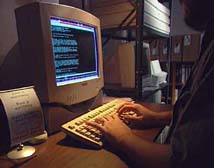The war hasn't spawned new viruses. Instead, the same old viruses are being sent with new subject lines in the e-mail.
Published:
2 April 2003 y., Wednesday
Computer viruses that a couple of weeks ago promised photos of naked women as an enticement may now claim to have a satellite photo of the war scene in Iraq.
If you get an e-mail that mentions Iraq in the subject line, be doubly cautious. It may contain a computer virus. Anti-war demonstrators have clogged Hyde Park in London and jammed city streets in America and across the world. Others wanting to make a strong political stand are using computer viruses as a high-tech protest sign.
Some viruses are being sent as a way to protest or support the war. Other senders could care less about politics and use the mention of Iraq as a way to capture the interest of computer users. It's a way of making sure they will open the e-mail attachment carrying the virus.
Politics aside, virus buffs "use anytime anything that is popular" as a subject line (such as "Iraqi Satellite Photos") to induce you to open the e-mail attachment, he said. "They used the shuttle, and now it's anti-war or anything against the president."
No matter what the subject line, the payload is still the same: an attachment carrying a computer virus. Many viruses come as attachments to an e-mail. The e-mail itself is safe, but opening the attachment can infect your computer.
Šaltinis:
ecommercetimes.com
Copying, publishing, announcing any information from the News.lt portal without written permission of News.lt editorial office is prohibited.
The most popular articles
Software company announced new structure_ of it_s business.
more »
 A number of MEPs urged Internal Market Commissioner Michel Barnier to come up with common rules to regulate cross border online gambling in Europe.
more »
A number of MEPs urged Internal Market Commissioner Michel Barnier to come up with common rules to regulate cross border online gambling in Europe.
more »
 Think before you post as once you do it is online forever. That was the message on Safer Internet Day marked on 9 February by a seminar in the European Parliament.
more »
Think before you post as once you do it is online forever. That was the message on Safer Internet Day marked on 9 February by a seminar in the European Parliament.
more »
 50% of European teenagers give out personal information on the web – according to an EU study – which can remain online forever and can be seen by anybody.
more »
50% of European teenagers give out personal information on the web – according to an EU study – which can remain online forever and can be seen by anybody.
more »
 When did the Commission start working on social networking sites?
more »
When did the Commission start working on social networking sites?
more »
 ICSA Labs, an independent division of Verizon Business, is the first independent security-product testing and certification laboratory to earn ISO/IEC 17025 accreditation, validating the laboratory's world-class capabilities.
more »
ICSA Labs, an independent division of Verizon Business, is the first independent security-product testing and certification laboratory to earn ISO/IEC 17025 accreditation, validating the laboratory's world-class capabilities.
more »
 From today, European citizens, businesses and organisations can register .eu website names using characters from all 23 official languages of the European Union.
more »
From today, European citizens, businesses and organisations can register .eu website names using characters from all 23 official languages of the European Union.
more »
 Authorities investigated 301 mobile phone services websites in follow-up to EU crackdown on misleading consumer practices.
more »
Authorities investigated 301 mobile phone services websites in follow-up to EU crackdown on misleading consumer practices.
more »
 After nearly 2 years of legislative work the Telecom Package is due to be put to a final vote in Parliament on 24 November in Strasbourg.
more »
After nearly 2 years of legislative work the Telecom Package is due to be put to a final vote in Parliament on 24 November in Strasbourg.
more »
 The Christian Science Monitor reports that three men have been named as being the masterminds behind the hacking of RBS WorldPay, a subsidiary of the Royal Bank of Scotland.
more »
The Christian Science Monitor reports that three men have been named as being the masterminds behind the hacking of RBS WorldPay, a subsidiary of the Royal Bank of Scotland.
more »
 BAI’s Banking Strategies Insights reports that banks must get serious about improving their ATMs, especially in the area of envelope-free deposit.
more »
BAI’s Banking Strategies Insights reports that banks must get serious about improving their ATMs, especially in the area of envelope-free deposit.
more »